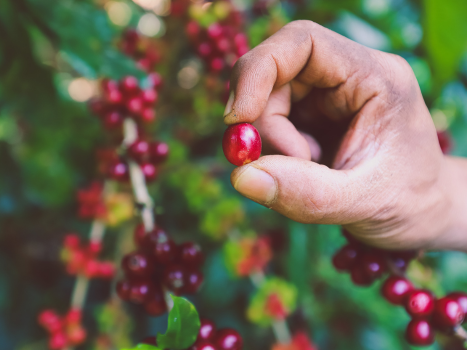Also of Interest
Tanzania AB - Jipemoyo
TOP LOT
| Bag Weight | 60 KG BAG |
|---|---|
| Harvest Season | 2022/23 |
| Status | Spot |
| Lot Number | P611460-5 |
About This Coffee


History of Coffee in Tanzania
Like other coffee growing regions in East Africa, it seems likely that coffee may have been known as a garden crop grown for barter and consumption (chewing rather than brewing) as early as the 16th century. German occupiers introduced commercial cultivation of at the end of the 19th century and coffee became an exported cash crop. Following WWI, the British took control of the region and the estate model was firmly established for coffee. During the transition years from British “protection” to independence, coffee farming cooperative began to emerge and would eventually dominate coffee production after formal independence in 1961. Today, 95% of coffee farmers are smallholders, growing coffee on less than 5 acres of land.
Growing Coffee in Tanzania
Exports from nearly every coffee growing country in Africa are lower now than they were twenty years ago. The most notable exception is Ethiopia, where coffee exports have reached 3 million bags, nearly double the number in 1997. Less dramatic, but nevertheless unique for Africa, is the strong and steady growth in Tanzania. Taking the average number of bags exported annually 2007-2017—to account for crop fluctuations—Tanzania experienced an increase of 11 percent over the previous 10 years. That might not seem like much until you consider that only two other African countries have experienced growth by the same measure, Ethiopia (37%) and Uganda (1%). Tanzania broke the million bags exported ceiling for the first time in 2009 and did it again in 2013. This increase in exports has coincided with a near 600 percent increase in domestic coffee consumption over twenty years. The only coffee growing country to experience a more dramatic increase is Vietnam, where domestic coffee consumption has grown by 700 percent over the same period.


- Region Mbeya
- Producer Type Washing Station
- Processing Washed
- Processing Description Fermented 28-48hrs, sun-dried on raised beds
- Bag Type Grain Pro / Ecotact
- Plant Species Arabica
- Variety KP423
- Min Growing Altitude 1550m
- On Sale No
- Top Lot Yes
- Status Spot
- Coffee Grade TZA CA WA AB
- CTRM Contract Number P611460-5
- Country of Origin Tanzania
- Warehouse The Annex CA





